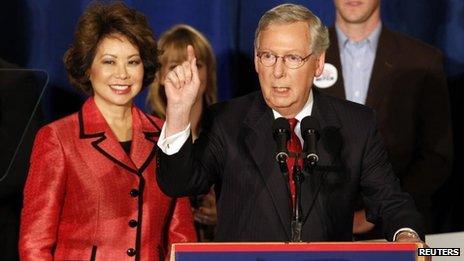Mark Mardell: Tea Party loses battle, if not the war
- Published
- comments

McConnell, shown on Tuesday night with wife Elaine Chao, easily despatched a well-funded opponent backed by the tea party
The Republican establishment in Washington is letting out a long sigh of relief - its standard bearers survived a concerted assault by the Tea Party, external.
Last night's primary elections will be taken as a significant turning point, external, the day the establishment fought back and won against conservative radicals.
The most important battle was in Kentucky, where one of America's most prominent Republicans, Senate Minority Leader Mitch McConnell, easily saw off the Tea Party's Matt Bevin, external. When I was in Kentucky recently for a Radio 4 documentary, Mr Bevin told me that people were frustrated with those he called "crusty curmudgeons of Congress" who had been in Washington too long. That doesn't appear to be true.
In Georgia too it was a couple of establishment types who got through to the next round.
The conventional wisdom is that the tide has turned against the Tea Party, its high water mark is past and it is they are a declining force, external.
That's true. Up to a point. There is certainly a new wariness against candidates who can be depicted as far-out loons and lose elections (it's different, but not so very different, to the British political establishment's assault on UKIP, external).
Republicans in Congress are fed up with their more radical colleagues whose purity and distaste for doing deals with the White House last year battered the image of Congress and indeed the whole of the US abroad. In the views of some they are all about ego and making extreme stands to get on TV - as one prominent Republican politician put it to me recently, "the workhorses have had it with the show horses. You can't underestimate the animosity".
And big money is going into the fight back.
But I've got two important caveats. The Tea Party has already done much of its work, pushing the party to the right. The Republican Party is in a bitter civil war - but it's about tactics and image, not ideology.
The Tea Party certainly hasn't got all it wants in terms of spending cuts, but the Republican Party has never been so conservative. And my visits to Texas and Kentucky confirmed my belief that the Tea Party is drawing on a deep well of support among Republican voters.
There's a strong sense of disillusionment with the establishment, anger over the decline of manufacturing and immigration, fear of a world that is changing very fast.
That is all still important. If the Republicans win the Senate in the autumn, they may not be any more willing to compromise and do deals than their colleagues in the House. When it comes to the presidential contest in 2016, the conservatives will still argue for a firmly right-wing candidate who paints in bold colours and doesn't compromise on the main issues.
Last night was an important battle, but not the whole war.